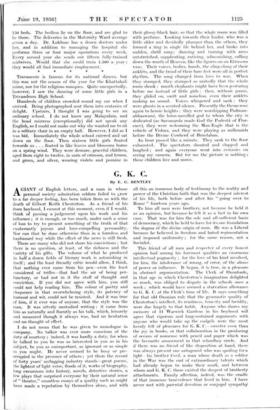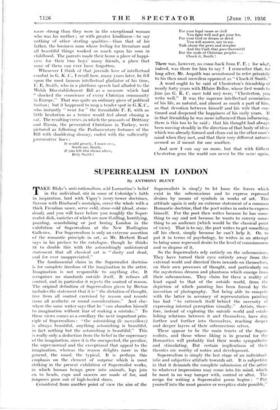G. K. C.
By E. C. BENTLEY
AGIANT of English letters, and a man in whose personal society admiration seldom failed to grow to a far deeper feeling, has been taken from us with the death of Gilbert Keith Chesterton. As a friend of his from boyhood, I cannot at this moment, even if I would, think of passing a judgement upon his work and his influence ; it is enough, or too much, under such a sense of loss to try to present something of the truth of that exuberantly joyous and love-compelling personality. Nor can that be done otherwise than in a formless and haphazard way while the effect of the news is still fresh.
There are many who did not share his convictions ; but there is no question, at least, of the richness and the variety of his gifts. The volume of what he produced in half a dozen fields of literary work is astonishing in itself ; and the least friendly critic would allow, I think, that nothing ever came from his pen—even the least considered of trifles—that had the air of being per- functory, or had not in it the stuff of thought and conviction. If you did not agree with him, you still could not help reading him. The colour of poetry and eloquence in that overwhelming style, its potency of humour and wit, could not be resisted. And it was true of him, if it ever was of anyone, that the style was the man. It was utterly unstudied writing ; it came from him as naturally and fluently as his talk, which, leisurely and measured though it always was, had no hesitation and no thought of effect.
I do not mean that he was given to monologue in company. No talker was ever more conscious of the duty of courtesy ; indeed, it was hardly a duty, for when he talked to you he was as interested in you as in his subject, be you as unimportant, as ignorant or as simple as you might. He never seemed to be busy or pre- occupied in the presence of others ; yet there the record of forty years' unflagging industry stands—great poems, the lightest of light verse, floods of it, works of biography, long excursions into history, novels, detective stories, a few plays that surprised everyone by their natural sense of " theatre," countless essays of a quality such as might have made a reputation by themselves alone, and with all this an immense body of testimony to the reality and power of the Christian faith that was the deepest interest of his life, both before and after his " going over to Rome " fourteen years ago.
To him all men were brothers, not because he held it as an opinion, but because he felt it as a fact in his own case. That was for him the sole and all-sufficient basis of democracy, which he held to have for its one foundation the dogma of the divine origin of man. He was a Liberal because he believed in freedom and hated regimentation and imposed uniformity ; for the same reason, not a Socialist.
This friend of all men and respecter of every honest opinion had among his foremost qualities an enormous intellectual pugnacity ; for the love of his kind involved, for him, the intolerance of wrong, of error, of the abuse of power or influence. It began, it is true, in a pleasure in abstract argumentation. The Clerk of Oxenforde, in that age in which Chesterton's imagination delighted so much, was obliged to dispute in the schools once a week ; which would have seemed a starvation allowance to G. K. C. at the Clerk's time of life. It says something for that old Oxonian rule that the gymnastic quality of Chesterton's intellect, its readiness, tenacity and lucidity, were due largely to that habit. Anyone who shares my memory of 11 Warwick Gardens in his boyhood will agree that vigorous and long-sustained arguments with anyone who would take up the cudgels were the most keenly felt of pleasures for G. K. C.—sweeter even than the joy in books, or that collaboration in the producing of oceans of nonsense with pencil and paper which was the favourite amusement in that schoolboy circle. And if there was no friend of like disposition at hand, there was always present one antagonist who was spoiling for a fight—his brother Cecil, a man whose death as a soldier in the War was the end of extraordinary talents which had already begun to make their mark, and between whom and G. K. C. there existed the deepest of brotherly attachments. Family affection, indeed, was the cradle of that immense benevolence that lived in him. I have never met with parental devotion or conjugal sympathy more strong than they were in the exceptional woman who was his mother ; or with greater kindliness—to say nothing of other sterling qualities—than that of his father, the business man whose feeling for literature and all beautiful things worked so much upon his sons in childhood. The parents made their home a place of happi- ness for their two boys' many friends, a place that none of them can ever have forgotten.
Whenever I think of that juvenile love of intellectual combat in G. K. C., I recall how, many years later, he fell upon the most famous intellectual gladiator of his time, F. E. Smith, who in a platform speech had alluded to the Welsh Disestablishment Bill as a measure which had " shocked the conscience of every Christian community in Europe." That was quite an ordinary piece of political fustian ; but it happened to rasp a tender spot in G. K. C., who instantly " went for " the formidable F. E. with as little hesitation as a terrier would feel about chasing a cat. The resulting verses, in which the peasants of Brittany and Russia, the persecuted Christians in Turkey, were pictured as following the Parliamentary fortunes of the Bill with shuddering dismay, ended with the sufficiently provocative lines :
It would greatly, I must own, Sooth me, Smith, If you loft this theme alone, Holy Smith ! For your legal cause or civil You fight well and get your fee.
For your God or dream or devil You will answer, not to me.
Talk about the pews and steeples And the Cash that goes therewith!
But the souls of Christian peoples ... Chuck it, Smith !
There was, however, no conic-back from F. E. ; for what, indeed, was there for him to say ? I remember that, for long after, Mr. Asquith was accustomed to refer privately to his then most merciless opponent as " Chuck-it Smith."
A word ought to be said of Chesterton's friendship of nearly forty years with Hilaire Belloc, whose first words to ,him (as G. K. C. once told me) were, "Chesterton, you write well." It was the supreme intellectual association of his life, as natural, and almost as much a part of him, as that devotion between himself and his wife that con- tinued and deepened the happiness of his early years. If in that friendship he was more influenced than influencing, there is this too to be said : that his thought had always been moving steadily in the direction of that body of ideas which was already formed and clean-cut in the other man's mind when they met, and that their very different natures seemed as if meant for one another.
And now I can say no more, but that with Gilbert Chesterton gone the world can never be the same again.











































 Previous page
Previous page